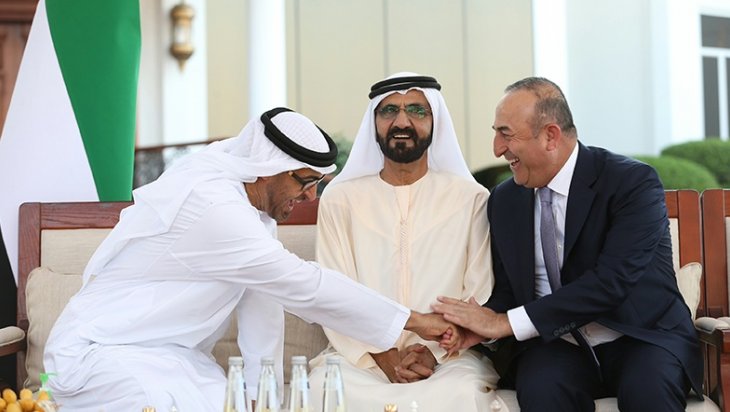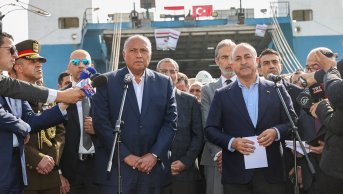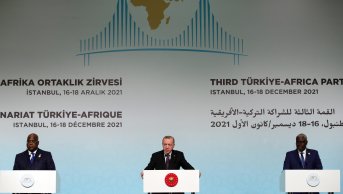Explaining the Meaning of the Détente in Turkey-UAE Relations

Efforts are made to overcome the tensions that have existed between Turkey and the United Arab Emirates (UAE) within the last months and not to noise the tensions about. Lastly, Minister of Foreign Affairs Mevlüt Çavuşoğlu visited UAE and held official talks in Abu Dhabi in order to end the disagreements and find a common ground between the two countries.
Çavuşoğlu negotiated with the Crown Prince in Abu Dhabi, the significant name of UAE regime which had a voice in the issues in which the disagreements between the two countries come to the forefront and with UAE Armed Forces Deputy Commander-in-Chief Sheikh Mohammed bin Zayed al Nahyan. In these negotiations, Çavuşoğlu stated that “the parties reciprocally underlined the importance of the relations between the two countries for the stability and security of the region in the following process”. This revealed that Turkey determined a new position in the relations with UAE.
“UAE government attempted several times to leave Turkey in difficult situations especially within the scope of foreign policy. It conducted activities against Turkey’s foreign policy notably in Libya, Tunisia and Egypt.”
Indeed, after the visit, UAE announced that it would send the ambassador that it had not assigned to Ankara for almost two years on May 7. At this point, it is important to answer the question of what Ankara means by putting such a policy into action.
Breaking Point of ‘Muslim Brotherhood’
Considering the background of the crisis between the two countries, it can be said that policies towards Muslim Brotherhood movement (MB) come to the forefront. Within the past years, UAE government has exercised serious extent of power over the Ikhwan and excluded the movement from political process. On the contrary, Turkey has considered Muslim Brotherhood as one of the significant actors in the region. The Ikhwan became an “ally” for Ankara after the movement rose to power in Egypt.
UAE is among the countries which felt the most disturbed by this situation and made serious attempts to remove the movement from office in Egypt. Of all, the most important attempt was the support given to the Tamarod movement during its foundation. It aimed to deepen the chaos in the country during the last months of Morsi’s term of office and to create a society-based front against Morsi. Having considerably supported the military coup staged under the leadership of Abdel Fattah el-Sisi, Abu Dhabi government was the most important prompter of the oppression policy that el-Sisi followed towards Muslim Brotherhood in the following process.
Erdogan administration took the toughest line and voiced constant criticism in the face of these developments in Egypt, which seriously disturbed UAE. Turkey opened its doors to the members of Muslim Brotherhood who had to leave Egypt. This caused Abu Dhabi to show more reaction to Ankara.
In the following period, UAE government made several attempts to leave Turkey in difficult situation especially in terms of foreign policy. It conducted activities against Turkey’s foreign policy notably in Libya, Tunisia and Egypt. Beyond this, certain media organs claimed that Abu Dhabi provided financial and logistics support to some groups in Turkey in order to overthrow the government in Ankara.
UAE is one of Turkey’s most important economic partners in the Middle East. Despite this, Turkey tried to maintain discreet relations with the UAE government. Within this framework, Ankara often took initiatives not to aggravate the crisis with UAE, one of its most important partners in the Middle East. Turkey wanted to maintain its current economic relations with UAE, which played a significant role in this regard even though they follow different policies towards Egypt and Muslim Brotherhood.
In terms of Turkey’s exports, UAE ranks second in the Middle East and ninth in the world with 4.6 billion dollars as of 2015. That is why Ankara knows that it should consider its economic relations as well as political relations with this country.
The elections in Turkey in 2015 triggered an atmosphere of uncertainty which started to affect the economy more deeply. This forced Ankara to maintain its current economic relations with foreign countries, which was efficient in the efforts to put the relations with UAE on the right track.
Furthermore, even though it is a relatively small country, UAE became an important actor in the regional and international politics especially by functionalizing its economic power. It acted together with Saudi Arabia in terms of several issues, notably Egypt and Muslim Brotherhood and it forged close ties with such countries as the USA, England, Russia and Israel, which may potentially damage the relations with Abu Dhabi and cause a serious loss for Ankara.
The relations with UAE are not on the desired level and even have a “tense” nature. This may lead Abu Dhabi to take steps that will leave Turkey even in a more difficult situation in certain fields of the foreign policy. An example of this happened after Turkey downed a Russian warplane. UAE made an official statement and implied that Turkey unjustly downed the plane. However, it took a step back and indicated that the statement was misunderstood upon the reaction of Ankara.
Considering the relations with the countries like Syria, Iran and Russia, Turkey has generally gone through adversities in its foreign policy in the last period. Therefore, it does not want to risk its relations with UAE which has an efficient role in the regional politics and prefers to enter a normalization process.
It can be said that Abu Dhabi also has a similar attitude if not with the same motivations. Indeed, it pursues different policies towards Egypt, which is seen as a reason for a serious division. However, there is an undeniable presence of factors which will allow UAE and Turkey to find a common ground.
The Impact of Saudi Arabia
One of the most important factors is the relations with Saudi Arabia which both countries see as an ally. UAE follows a policy in parallel to Saudi Arabia in terms of the approach towards Syrian civil war, the response to Iran’s expansionist policy, the intervention in Yemen and the fight against DAESH.
On the other hand, Turkey also has similar positions to Riyadh and Abu Dhabi in this regard. Therefore, from the viewpoint of Saudi Arabia, these three countries cannot form a stronger alliance in the regional politics if Ankara and Abu Dhabi follow hostile policies against each other. In this sense, it is vital that Turkey and UAE change their attitudes towards each other so that the differences could be reduced to the minimum level and a common front can be created in case of the crises in the region.
It can also be said that UAE is generally aware of the risks of following a policy against Turkey in its foreign policy. Furthermore, UAE government has realized that Turkey has an increasing power in the region so it wants to reduce the matter of disputes with Ankara and does not prefer to directly face opposition of Turkey.
Certain moves that UAE has made in the last period have failed to yield the desired results, which has an influence on this decision. This shows that UAE has a limited influence when its foreign policy is concerned. For example, Turkey took initiatives to prevent the civil war in Libya and form a unitary government whereas UAE supported the counter-revolutionist groups and contributed to the deepening of the chaos in the country. However, it can be said that these groups failed. Furthermore, Abu Dhabi considerably supported the Saudi-led intervention in Yemen, but could not show any progress in gaining superiority over Iran-backed groups in the country. Therefore, Riyadh and Abu Dhabi, pioneers of the operation called Decisive Storm in Yemen, tried to draw the countries such as Turkey and Egypt, which will be influential in the field, on their side.
Cooperation with a powerful country like Turkey in the regional politics, a close position to that of Ankara and parallel actions with this country will also have positive effects on the foreign policy for BAE.
Within this context, it will be a more rational choice for Turkey and UAE to develop common strategies by focusing on the priorities instead of differences of their foreign policies.










